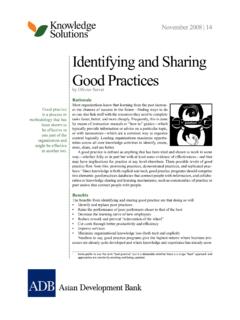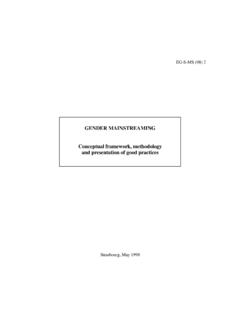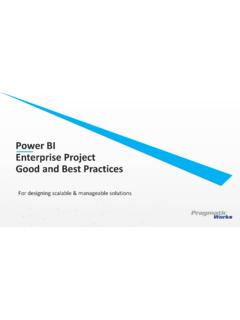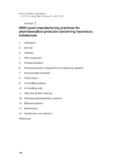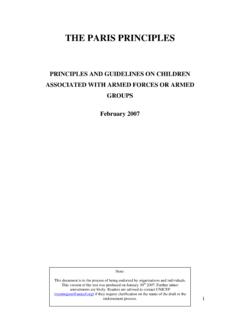Transcription of GOOD PRACTICES IN DEVELOPMENT COMMUNICATION
1 good PRACTICES IN DEVELOPMENT COMMUNICATION good PRACTICES IN DEVELOPMENT COMMUNICATION The DEVELOPMENT Centre of the Organisation for Economic Co-operation and DEVELOPMENT was established in 1962 and comprises 24 member countries of the OECD: Austria, Belgium, Chile, the Czech Republic, Finland, France, Germany, Iceland, Ireland, Israel, Italy, Korea, Luxembourg, Mexico, the Netherlands, Norway, Poland, Portugal, Slovak Republic, Spain, Sweden, Switzerland, Turkey and the United Kingdom.
2 In addition, 18 non-OECD countries are full members of the DEVELOPMENT Centre: Brazil (since March 1994); India (February 2001); Romania (October 2004); Thailand (March 2005); South Africa (May 2006); Egypt and Viet Nam (March 2008); Colombia (July 2008); Indonesia (February 2009); Costa Rica, Mauritius, Morocco and Peru (March 2009), the Dominican Republic (November 2009), Senegal (February 2011), Argentina and Cape Verde (March 2011) and Panama (July 2013). The European Union also takes part in the work of the Centre.
3 The DEVELOPMENT Centre occupies a unique place within the OECD and in the international community. It provides a platform where developing and emerging economies interact on an equal footing with OECD Members to promote knowledge sharing and peer learning on sustainable and inclusive DEVELOPMENT . The Centre combines multidisciplinary analysis with policy dialogue activities to help governments formulate innovative policy solutions to the global challenges of DEVELOPMENT .
4 Hence, the Centre plays a key role in the OECD s engagement efforts with non-member countries. To increase the impact and legitimacy of its work, the Centre adopts an inclusive approach and engages with a variety of governmental and non-governmental stakeholders. It works closely with experts and institutions from its member countries, has established partnerships with key international and regional organisations and hosts networks of private-sector enterprises, think tanks and foundations working for DEVELOPMENT .
5 The results of its work are discussed in experts meetings as well as in policy dialogues and high-level meetings, and are published in a range of high-quality publications and papers for the research and policy communities. For more information on the Centre, please see The opinions expressed and arguments employed in this document are the sole property of the authors and do not necessarily reflect those of the OECD or of the governments of its member countries. good PRACTICES IN DEVELOPMENT COMMUNICATION OECD 2014 3 FOREWORD In a changing world COMMUNICATION about DEVELOPMENT challenges and advocacy for change have become increasingly complex.
6 The Millennium DEVELOPMENT Goals (MDGs) are being revisited in the context of the post-2015 framework and official DEVELOPMENT assistance (ODA) from OECD countries is less central to DEVELOPMENT debates than it was before because of the rise in the number of new donors and funding mechanisms. At the same time, the number of issues on the DEVELOPMENT agenda seems to be increasing (poverty reduction, climate change, inequalities, etc.). This study, which has been supported by input from members of the OECD DEVELOPMENT Centre s Informal Network of DEVELOPMENT Assistance Committee (DAC) DEVELOPMENT Communicators (DevCom), has been developed as a compass for orientating DEVELOPMENT practitioners involved in COMMUNICATION .
7 It specifically identifies some of the most pressing challenges faced by directors and senior staff in charge of COMMUNICATION in DEVELOPMENT ministries and official aid agencies in OECD and non-OECD countries alike. It offers insights into practical tools, innovative PRACTICES and emerging trends in the field of DEVELOPMENT COMMUNICATION . For instance, it helps in making sense of the public s uneven and, at times, even seemingly contradictory position regarding aid, by highlighting the importance and the limitations of opinion polls in helping inform and develop COMMUNICATION strategies.
8 Created in 1988, DevCom is a global network of directors of public affairs and senior COMMUNICATION staff of DEVELOPMENT ministries and agencies. DevCom supports donors in addressing the challenges of COMMUNICATION about DEVELOPMENT and DEVELOPMENT activities through the exchange of information, with comparative analysis and peer learning. This is done to improve accountability and DEVELOPMENT impacts. With more than two decades of experience in analysing strategies for informing and influencing public awareness and support for DEVELOPMENT co-operation, DevCom has built a strong capacity to generate, harvest and disseminate good PRACTICES in DEVELOPMENT COMMUNICATION globally.
9 This study has a number of objectives: to compile lessons learned from the DevCom Network through the years; to create a collection of good PRACTICES ; and to add to the wider dialogue on issues facing DEVELOPMENT communicators and practitioners around the world. The topics covered in this study range from the broad, such as public opinion for DEVELOPMENT co-operation and the use of new media and communications tools, to the specific, such as the design of COMMUNICATION strategies by DEVELOPMENT agencies and the challenges faced in monitoring and measuring the impact of COMMUNICATION interventions.
10 In addition, new issues on the agenda of international co-operation are analysed and unpacked from a DEVELOPMENT COMMUNICATION perspective. These include challenges such as addressing and financing climate change interventions, the changing traditional donor-recipient relationship, and the increase in the number of actors in DEVELOPMENT co-operation. Such global challenges mean that DEVELOPMENT ministries and agencies need to reflect more systematically on what their mission is and how to leverage their COMMUNICATION strategy to support their political and technical positioning.










